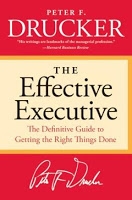If you had to choose, if you only had limited funds to invest in leadership development…what would you invest in and why? Seriously consider this question and write your answer down before reading any further.
Are You Ready to Make a Change?
For many of my readers, particularly those who follow me on Twitter, I announced that I would be vlogging and blogging through the book The Effective Executive by Peter Drucker. It popped up on my radar a couple of years ago with a few clients – one who’d given the book as a gift to their executive team and another who made it required it as part of their monthly leadership read. For those not aware of who he is, he is known as the father of modern management. This book was first published in 1967.

As someone who is familiar with the concept of being effective through my time management workshops taught for many years throughout North America and the companion book I authored, Organizational Strategies for the Overwhelmed, I am keenly aware of the importance of being effective.
So I was particular struck by the substantial weight Mr. Drucker gives it as critical skill for executive leadership.
From my initial read of the first few chapters, I have found particularly compelling the following:
1> Mr. Drucker makes a fascinating case for effectiveness as a critical skill for all knowledge workers at all levels as well as executive leaders. He sees being an executive beyond a title or place in an organizational hierarchy. I wrote a post addressing that here: Leadership Tip: Boost Your Impact – Be an Executive!
2> Additionally, after his years of observation and working with a volume of diverse leaders in a variety of corporate structures – non-profits, government as well as traditional c-suite, he sees effective executive leadership as incredibly valuable and equally rare.
3> And finally – and this is what I found the most interesting, particularly from my years of working in the field of leadership & management development, he sees developing the skill of effectiveness as the #1 most important skill to invest in and focus on.
He believes that this should be the #1 priority in executive development.
He offers 4 key points:
– Effectiveness is about achieving results – which is the entire purpose and point of being a leader.
– Being effective can make up for a deficit of other qualities or capabilities leaders ideally need (this was as eye-opener and yet made perfect sense as he explains it).
– Effectiveness is typically not natural. It must be and can be learned – which of course is the good news!
– Being effective is not complicated, but actually rather simple. It is the habitual practice of a few strategic actions. He stated, “Effectiveness is a discipline.”
So, Why Invest In & Treat Effectiveness as a #1 Priority?
This part was really quite interesting…
Drucker emphasizes that a leader can have good qualities, have certain skills and relevant knowledge and yet not be able to translate them into meaningful results – in other words, leverage them into something of value.
Value defined: worth, merit, importance
So, as it goes with traditional perceptions of leadership value and how to increase it – it is believed that an executive or leader would do better – perform better – (aka get better results) if they had more, for example:
- knowledge about a particular topic
- better vision
- more creative thinking
- better “executive presence”
- speaking skills
- personal development through executive coaching
… to name a few. So that’s where the training and development money goes.
Drucker asks…even if those were increased – would that person be able to translate those gains into improved results?…are they even necessary for improved results?
He observed that raising the standard for abilities, adding more, improving the current list didn’t necessarily or automatically convert into needed outcomes – as expected. This is a profound finding.
Compelling point => Someone can improve in a variety of areas and still not achieve what’s needed. Typical thinking goes like this…”We’re not getting the results we want, so we need to improve x, y, z – developing effectiveness is not typically on this list.
This is a critical insight related to training and development spend for any employee, especially leaders and managers. By the way, he includes in the definition of executive effectiveness, the ability to develop that capability in others.
Effectiveness – the ability to translate any volume or level of skill, knowledge or quality into a needed result is a separate, distinct capability and is the power partner to all others. It’s what makes the rest matter!
It’s kinda like all the delicious, expensive ingredients used to make bread will not matter and be experienced as intended – in fact go to waste – if the yeast is omitted.
Yeast is a converting agent…as is the skill of effectiveness.
His, what I saw as a very compelling argument, is that the better approach is to first make better use of what’s already present – learn to convert what’s current available – see what can be converted into more value through learning to be effective – since that’s the goal anyway.
This is a fascinating truth => a variety of people with a variety of capabilities can produce needed results – even without adding more capabilities, knowledge or qualities. Or put another way, someone with a lot of impressive experience and capabilities can still be ineffective.
Think about this for a moment. Consider this from the training and development industry. It suggests there are has been a boat load of money wasted because our focus and expectations have been misplaced.
To drive home the point, he asks this probing question, “Can a leader translate their qualities, skills and knowledge (and of those they lead) into results?” His observation…many don’t because being effective is not treated seriously, clearly defined and is confused with activity.
The perceived value is seen as this, “He/she is certainly busy doing stuff.” Activity is seen as the value rather than what the activity is producing. And therefore, a lot of money is wasted investing in senior leadership that returns little meaningful value and in some cases none. (Of course in some cases there has been even a loss).
So let’s circle back to our opening question,, “If you had to choose, if you only had so much money to invest….where would you invest it and why?” After reading this, perhaps learning to be effective will now be your answer. You can send me a thank you card for all the money you will save after reading this post. You’re welcome! 
Business & Finance Articles on Business 2 Community
(74)









